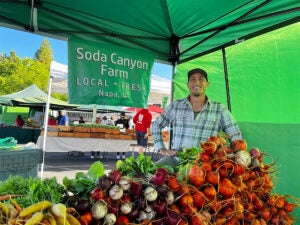With racial tensions particularly high in recent years across the United States, many organizations and individuals have advocated for a re-examination of that relationship in society. In a variety of industries, it was insufficient to be passive in the face of racism, but instead there was a push to be actively engaged in fighting the facets of discrimination.
The food and farming communities are among those changing their approach and recognizing how both overt and institutional racism have a corrosive impact on the marginalized people who need access to things like food and jobs.
Proposed in 2020 — the same year George Floyd’s murder was dominating national headlines — the Farmers Market Coalition (FMC) started working with a committee of food systems experts to develop the Anti-Racist Farmers Market Toolkit.
The toolkit took two years to develop and was released in 2022 on FMC’s website. It is meant to be a resource for market leaders to cultivate and nourish an anti-racist environment at farmers markets.
Sagdrina Brown Jalal, the founding executive director of the Georgia Farmers Market Association (GFMA) and a former board member of FMC, led the development of the toolkit. Rachael Ward, who worked at FMC as a project manager, spoke with Jalal about the need for such a resource, and the idea gained traction and support from the organization.

Jalal’s advocacy and work in food systems is fueled in part by her diagnosis with lupus during her third pregnancy. In an effort to be more aware and conscious of her nutrition, she began looking into her food sources and how to source more locally. This eventually led to her work consulting various organizations on how to address food justice in their community.
“[My] goal was to connect [people] with information on the nutritional value of food and how to access that food locally,” Jalal said.
Peppered throughout the resource are guides and explanations for the reader to further understand the drive and motivations behind the directives of the toolkit.
For example, the toolkit poses contemplative questions to the reader, giving them an opportunity to think critically about the root causes of certain practices they may have at their market or about mission statements and how to make them more inclusive.

In addition to inviting more critical thinking, the toolkit provides guidelines via flowcharts and “how to do it” sections that users can follow to help guide them toward more anti-racist practices at their market.
As a Black woman, Jalal said she intrinsically understood that a lack of information and education resulted in disparities in diet and health conditions between racial groups in America. When the opportunity to develop solutions to this problem arose, Jalal valued building a resource that would center Black people and their unique perspectives.
With FMC’s support, Jalal led the development of the toolkit by curating a committee of Black food systems experts to develop and create the resource.
By bluntly calling it an anti-racist toolkit, Jalal and the committee hoped to communicate to farmers markets that representation for the sake of reputation is not enough — rather, markets should develop relationships with existing organizations and organizers that are positioned to connect the market to a cross-section of racially and culturally diverse shoppers and vendors in their community.
“Being anti-racist is more than a ‘Black Lives Matter’ sign in your yard. It takes intention and action,” Sagdrina explains.
Unlike other toolkits or diversity, equity, and inclusion worksheets, the Anti-Racist Farmers Market Toolkit is “meant to be a living document, more than just another PDF that sits in a resource library or on a desktop. … We hope it will be the basis of concrete changes in the function of farmers markets,” according to FMC’s website.
Beyond fostering an anti-racist environment at farmers markets, the toolkit is a resource to help market managers make adjustments to structure, design, and operation of the market.
By bringing in community members who have lived and worked in the food systems space while experiencing setbacks and racism themselves, Jalal knew that insights and creative solutions would be generated.
East Lansing Farmers Market in Michigan is one of the first markets to utilize the toolkit and begin measuring its impact. Managed by Karla Forrest-Hewitt, who became the manager in 2018, the market has worked hard to address its policies, practices, and infrastructure to be more inclusive.
When Forrest-Hewitt became the market manager, she was the first woman of color in that role — and she knew that more could be done to make the market welcoming and supportive to both clients and vendors.
“The things I witnessed coming into the market were not beneficial for the market to thrive and grow … [and] the toolkit gave me the confidence to start addressing the issues I saw,” Forrest-Hewitt said.

The toolkit features four distinct categories, under different “buckets”: management, mission, messaging, and measurement. While each category is its own, their intersection and overlap are heavily emphasized, with the expectation that the toolkit’s adopters will revisit and cross-reference each section often.
By providing a framework for market managers to thoroughly understand and springboard their initiatives, the toolkit makes it easier and more tangible for markets to implement anti-racist policies.
Examples of changes that Forrest-Hewitt has implemented to her market include developing an inclusivity statement, increasing the diversity of the vendors, and more thoughtfully considering what music performances to host during market hours. Ranging from big to small, Forrest-Hewitt could tell the changes “really create a wonderful environment for the market.”
Another market, Napa Farmers Market in Napa, California, has also begun implementing the toolkit. FMC’s statement on supporting racial justice in 2020 caught the market’s eye, and the toolkit provided a springboard for the market to begin assessing how it operates.
Cara Mae Wooledge, the director of the market, knew that she wanted to demonstrate a commitment to real change.
“We started the process by having an honest conversation. … Was a statement necessary? Was it a good idea? Did we have time to dedicate to this effort considering the pandemic? The answer to all our questions was, ‘Yes,’” Wooledge said.
Wooledge and an ad hoc committee released an action statement to the public, of which she said, “The response from our followers, customers and community has been overwhelmingly positive.”
Additionally, Wooledge became a member of the First 5 Napa Network (F5NN) Cohort Three facilitated by First 5 Napa County, which focuses on long-term, equity-centered, systems level community change by having tough conversations about race, power, gender, and other issues of equity.

By integrating anti-racism policies into their strategic plan, Napa Farmers Market is actively focused on making forward progress.
“Through both external and internal work, we can make strides to ensure the Napa Farmers Market truly is our community’s market in terms of equity and social justice and a place where all people feel a sense of belonging,” Wooledge said.
In keeping with the toolkit’s “measurement” section back in east Lansing, Michigan, Forrest-Hewitt is working with Michigan State University to conduct a survey to assess the impacts that these changes have made for the market and its community members. With over 2,000 responses so far, Forrest-Hewitt is looking forward to what further beneficial changes can be brought to her market.
As more markets seek ways to be more inclusive, the Anti-Racist Farmers Market Toolkit is poised to be an excellent resource for market managers and leaders.
A unique and critical aspect of the creation of this resource was FMC’s supportive, not leading, role. By recognizing its infancy in anti-racism policies, FMC’s decision to support and assist without controlling the creative process is a testament to their dedication.
“Everyone was on board with it in the beginning,” Ward said, “but in practice, it took a lot of corrections and patience. … We really had to give up ownership over a timeline and a certain process that we want [and] really let folks guide it in the way that feels best to them.”
Jalal and the work group acknowledge that each farmers market is unique, with its own challenges and barriers to implementation. To that end, she firmly believes that embedded within the market’s desire to utilize the toolkit, there should also be a willingness to engage with others who understand the issues being tackled.
Ultimately, FMC and Jalal see the toolkit as a pathway that can facilitate farmers markets as agents of change to better serve the full spectrum of their community.
“Farmers markets have a responsibility to platform Black farmers,” said Jalal. “By creating [these] platforms … markets can acknowledge the incredible contributions made by Black people as well as amplify the voices of Black growers. This will help fortify an inclusive local food landscape.”
This article was published by AGDAILY on behalf of American Farmland Trust. Read American Farmland Trust’s DEIJ statement.
Liza Thuy Nguyen serves as the 2023 American Farmland Trust Agriculture Communications Intern at AGDAILY, with a focus on helping to amplify diversity and minority voices in agriculture. Liza is originally from Anaheim, California, and attended the University of California, Davis, as a first-generation college student. She received a bachelor’s degree in genetics and genomics and went on to earn a master’s in horticulture from Penn State.





